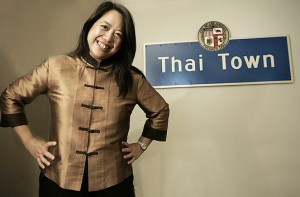The World’s Only Thai Town
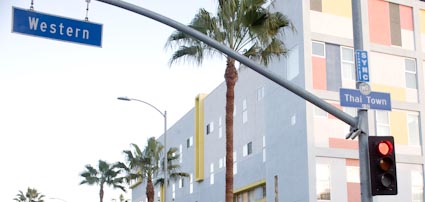 In 1999, the World’s First and Only Thai Town was officially designated by the Los Angeles City Council. The designation of Thai Town was an economic strategy to revitalize an otherwise depressed and neglected section of East Hollywood through cultural-based tourism. After an 8 year protracted campaign facilitated by Thai CDC, the Thai community won the City of Los Angeles designation of Thai Town in East Hollywood on October 27, 1999. Located in Hollywood, the area that is now known as Thai Town has served as the historic port of entry for newly arrived Thai immigrants, and has seen the proliferation of Thai-owned businesses over the last fifty years. Today, Thai Town is home to about 60-plus Thai businesses, including silk shops, bookstores, and restaurants. Thai Town is also the site of several historic Los Angeles structures and landmarks, such as the Don Carlos Apartments, Trianon Apartments, and the Mayer Building on Hollywood and Western. Thai CDC’s leadership and commitment to Thai Town’s cultural heritage preservation endeavors has also included its commitment to protecting historic properties through adaptive reuse.
In 1999, the World’s First and Only Thai Town was officially designated by the Los Angeles City Council. The designation of Thai Town was an economic strategy to revitalize an otherwise depressed and neglected section of East Hollywood through cultural-based tourism. After an 8 year protracted campaign facilitated by Thai CDC, the Thai community won the City of Los Angeles designation of Thai Town in East Hollywood on October 27, 1999. Located in Hollywood, the area that is now known as Thai Town has served as the historic port of entry for newly arrived Thai immigrants, and has seen the proliferation of Thai-owned businesses over the last fifty years. Today, Thai Town is home to about 60-plus Thai businesses, including silk shops, bookstores, and restaurants. Thai Town is also the site of several historic Los Angeles structures and landmarks, such as the Don Carlos Apartments, Trianon Apartments, and the Mayer Building on Hollywood and Western. Thai CDC’s leadership and commitment to Thai Town’s cultural heritage preservation endeavors has also included its commitment to protecting historic properties through adaptive reuse.
The goal in establishing Thai Town is to promote neighborhood pride, economic development, cultural exchanges, and tourism. It is important to the Thai community not only because it provides a cultural experience, but also because it acknowledges the history of the Thai community in Los Angeles. Thai Town is a form of community empowerment, because it has helped establish a Thai identity within the diversity of Los Angeles. Since the designation, Thai CDC continues to collaborate with fellow Thai community stakeholders and to provide leadership to the development of Thai Town’s tourism infrastructure, raising the community’s visibility, and providing support for small businesses and community asset building to establish this relatively small commercial center as a cultural destination.
East Hollywood
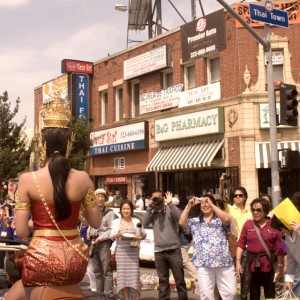
The East Hollywood area has been the site of the Thai American diaspora both as a business enclave and source of social/family networks, employment and housing. This is primarily because Hollywood is a well-known destination among Thais. Therefore, when Thais made the decision to immigrate to the United States, they chose to settle in Hollywood. The first Thai business in Los Angeles is the Bangkok Market on Melrose Avenue, which specializes in Thai and Southeast Asian groceries. Thus, LA’s East Hollywood area has become a major cultural and economic hub through a concentration of bilingual services, jobs, and family connections.
The Thai CDC successfully secured $1.3 million from the former Community Redevelopment Agency of Los Angeles (CRA/LA) to implement a comprehensive streetscape project along a one- mile stretch of Hollywood Boulevard, between Western and Vermont Avenues. This project was approved by the CRA/LA in 2004 after proposed by Thai CDC in 2000 as a vital component for economic development. The long-term objective of the East Hollywood Streetscape Project is to incorporate and encourage the installation of:
- Thai style street lamps.
- Banners.
- Redesigned crosswalks.
- Renovated sidewalks.
- “Golden Trumpet” trees to represent Thais in LA.
National Designation of Thai Town
In 2008, Thai CDC expanded its partnership with the four Asian Pacific Islander (API) communities in Los Angeles that it has longstanding relationships with to pursue a national designation by the White House of all five API towns as a Preserve America neighborhood. The other API towns include Chinatown, Little Tokyo, Historic Filipinotown, and Koreatown. Together, the five communities formed the API Preserve America Neighborhood Coalition (API PANC). Thai Town was officially designated a Preserve America neighborhood in 2008 and Thais are now officially recognized for their cultural and historical contributions to the fabric of the United States. This federal initiative encourages community efforts to preserve and enjoy its national and cultural heritage.
The designation seems so appropriate as Thai CDC’s efforts in Thai Town have always been in line with the goals of Preserve America, which are to ensure that our community protects and celebrates its heritage, uses its historic assets for economic development and community revitalization, and encourages people to experience and appreciate local historic resources through education and heritage tourism programs.
Here is an excerpt from First Lady Laura Bush’s comments: “Preserve America Communities demonstrate that they are committed to preserving America’s heritage while ensuring a future filled with opportunities for learning and enjoyment,” Mrs. Bush said. “This community designation program, combined with the Preserve America Grant Program, Preserve America Presidential Awards, and other federal support, provides strong incentives for continued preservation of our cultural and natural heritage resources. I commend you for your commitment to preserving an important part of our nation’s historic past for visitors, neighbors, and, most importantly, for children.”
The Importance of Thai Town (partial list):
- Improves and Strengthens our Community’s Image and Economy
- Protects and Celebrates Thai Culture and Heritage
- Ensures Focus on Historical and Cultural Authenticity
- Historical, Cultural and Commercial Center
- Historic Port of Entry
- Cultural Destination
- Employs Community Based and Sustainable Cultural Heritage Tourism
- Strategy for Economic Development
- About Community Building and Neighborhood Revitalization
- Promotes Beautification
- Instills Cultural Preservation
- Provides Community Benefits
- Place of Exchange and Equity
- Emphasizes Equitable Development
- Health and Wealth Zone
- Transit Oriented District
- Preserve America Neighborhood
- Employs Heritage Marketing
Community Projects
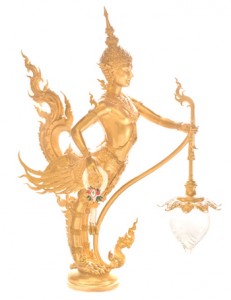 Kinarra Lamposts Celebrating over a decade of a vibrant and resilient Thai Town, Thai CDC completed the Thai Town Sidewalk Kinnara Lamppost project in April 2013 continuing the momentum for Thai CDC’s cultural tourism strategy to spur economic development in East Hollywood. The project is a gift from the Thai government to the City of Los Angeles. The long-term objective of Thai CDC is to incorporate the development of Thai-stylized amenities in the public right of way or sidewalk as part of its cultural tourism strategy. Successful public right of way projects in Thai Town include: the “golden trumpet” trees of the Greener Thai Town Initiative with the City of Los Angeles and the Office of the Royal Thai Consulate General of Los Angeles and the decorative brick sidewalk along Hollywood Boulevard. A major component of the sidewalk Kinnara Lamppost project also includes the Apsonsi or Thai Angels Gateway at the eastern and western-most ends of the district. Other design elements to highlight Thai Town’s rich cultural heritage are developed in partnership with the City of Los Angeles and the Office of the Royal Thai Consulate General of Los Angeles. These
Kinarra Lamposts Celebrating over a decade of a vibrant and resilient Thai Town, Thai CDC completed the Thai Town Sidewalk Kinnara Lamppost project in April 2013 continuing the momentum for Thai CDC’s cultural tourism strategy to spur economic development in East Hollywood. The project is a gift from the Thai government to the City of Los Angeles. The long-term objective of Thai CDC is to incorporate the development of Thai-stylized amenities in the public right of way or sidewalk as part of its cultural tourism strategy. Successful public right of way projects in Thai Town include: the “golden trumpet” trees of the Greener Thai Town Initiative with the City of Los Angeles and the Office of the Royal Thai Consulate General of Los Angeles and the decorative brick sidewalk along Hollywood Boulevard. A major component of the sidewalk Kinnara Lamppost project also includes the Apsonsi or Thai Angels Gateway at the eastern and western-most ends of the district. Other design elements to highlight Thai Town’s rich cultural heritage are developed in partnership with the City of Los Angeles and the Office of the Royal Thai Consulate General of Los Angeles. These
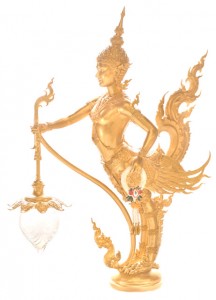 enhancements to the City of Los Angeles’ existing street lighting will draw attention to Thai Town. With these enhancements, the economic implications for place making and neighborhood identity are strong. As Thai CDC’s partnership with the city’s Community Redevelopment Agency comes to an end, it will be even more important for continued support of projects like these by the Office of the Royal Thai Consulate General of Los Angeles and the City of Los Angeles. To read more about the Flight of the Kinarra from Bangkok to Los Angeles click here.
enhancements to the City of Los Angeles’ existing street lighting will draw attention to Thai Town. With these enhancements, the economic implications for place making and neighborhood identity are strong. As Thai CDC’s partnership with the city’s Community Redevelopment Agency comes to an end, it will be even more important for continued support of projects like these by the Office of the Royal Thai Consulate General of Los Angeles and the City of Los Angeles. To read more about the Flight of the Kinarra from Bangkok to Los Angeles click here.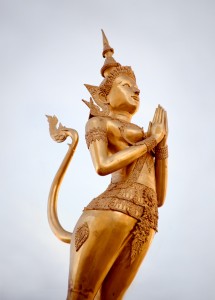 Apsonsi The Thai Angels greet locals and visitors to Los Angeles’ Thai Town from their position at the district’s western and eastern gateway on Hollywood Boulevard. Apsonsi is one of the many hybrid creatures depicted in ancient South and Southeast Asian folklore and is said to dwell in the legendary Himmapan Forest in the Himalaya Mountains between India and Nepal. The Apsonsi is a half-woman, half-lion figure believed to be the protector from harm. Four Apsonsi statues stand at the four corners of Thai Town as symbolic guardians of the Thai cultural and commercial corridor. Apsonsi figures stand guard at Wat Phra Kaew or the Emerald Buddha Temple, a historic site in Bangkok, Thailand.
Apsonsi The Thai Angels greet locals and visitors to Los Angeles’ Thai Town from their position at the district’s western and eastern gateway on Hollywood Boulevard. Apsonsi is one of the many hybrid creatures depicted in ancient South and Southeast Asian folklore and is said to dwell in the legendary Himmapan Forest in the Himalaya Mountains between India and Nepal. The Apsonsi is a half-woman, half-lion figure believed to be the protector from harm. Four Apsonsi statues stand at the four corners of Thai Town as symbolic guardians of the Thai cultural and commercial corridor. Apsonsi figures stand guard at Wat Phra Kaew or the Emerald Buddha Temple, a historic site in Bangkok, Thailand.
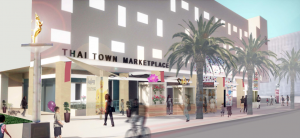
- The Thai Town MarketPlace is an innovative approach to community revitalization which facilitates economic empowerment and improvement of public spaces. It is a self-sustaining business incubator in a public market setting that is a living, dynamic entity, which will evolve over time to maintain its economic viability. Representing Thai CDC’s first commercial venture, the Thai Town Marketplace, to be located at the Hollywood/Western Redline Metro Stop at the gateway of Thai Town, is designed to be a social enterprise business incubator that aims to create living-wage jobs and economic self- sufficiency for Thai and other ethnic entrepreneurs in the East Hollywood area. The project strives to reduce barriers to small business ownership and enhance cultural tourism by increasing public transit use and activating the sidewalk. Thai CDC received $468,821 from the US Department of Health and Human Services Office of Community Services and another $892,200 from the Mayor’s Office of the City of Los Angeles for the development costs of the market. In total, Thai CDC has raised $1,393,821 or 87% of the total development cost of $1.6 million when also including grants from the Federal Home Loan Bank of San Francisco, Union Bank Foundation, the Catholic Campaign for Human Development, and in-kind services from CTG Energetics. Thai CDC is currently undergoing the entitlement process to be permitted by the City of LA Planning Department and the Metropolitan Transit Authority to begin renovations of the almost 5,000 square feet of retail space and over 2,000 square feet of outdoor space. This project will provide 19 business start-up opportunities and create at least 38 permanent jobs. Once opened, there will be synergy between our daily indoor market and our weekly outdoor farmers’ market currently operating on the MTA Portal Plaza selling fresh affordable produce.


